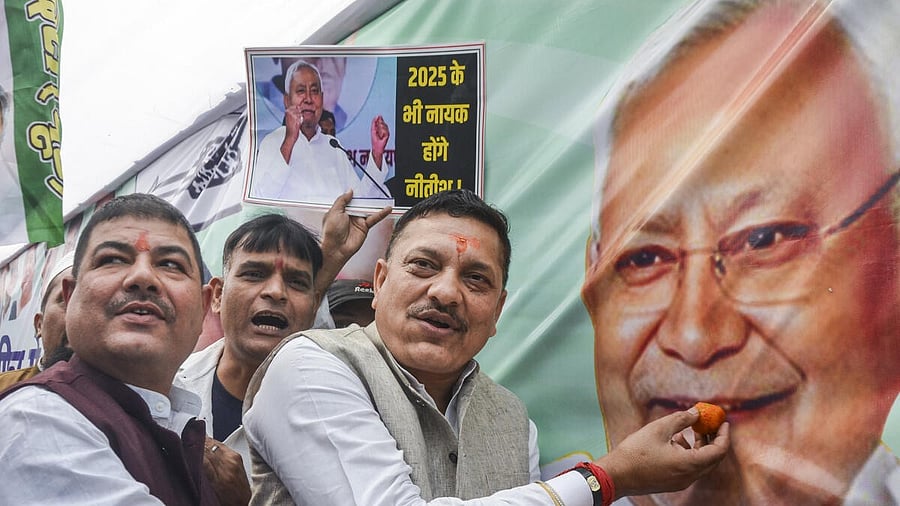
JDU members celebrate as the NDA alliance leads during the counting of votes of the Bihar Assembly elections, in Patna.
Credit: PTI photo
With the counting of Bihar Assembly Elections underway, it has become clear that the National Democratic Alliance (NDA)'s grip over the region has only tightened further.
On the other hand, the Mahagathbandhan suffered a massive blow, with the alliance leading in less than 40 seats.
Despite the final results still not being announced, members of BJP and JD(U) have already begun celebrating their 'victory'.
Let's take a look at the key takeaways of Bihar Assembly Elections 2025.
Strong lead by NDA
The National Democratic Alliance started strong by leading in 200 seats in early trends and delivering an early verdict for the much anticipated elections.
With BJP and JD(U) placed well ahead across many seats, the NDA's lead was crossed the halfway mark fairly early. Thus, the alliance could post its biggest tally with an excellent strike rate.
In 2020, the NDA was able to secure only 125 seats just above the majority threshold— thus returning stronger in these elections.
Opposition's poor performance
The Mahagathbandhan faired very poorly, only taking the lead in 39 seats.
While RJD was able to lead in 30 seats, the Congress could only lead in 5, making this one of their worst performances.
In 2020, the Grand Old Party was able to secure 19 votes while RJD secured 75.
Double-engine sarkar
NDA's 'double engine sarkar' struck a chord with voters of Bihar. In a coordinated effort, Bihar Chief Minister Nitish Kumar, Union Minister Amit Shah and Prime Minister Narendra Modi helped to sell the idea of an efficient state which will work for the betterment of the people.
The fear of 'Jungle Raj'
NDA's tactic of labeling the Mahagathbandhan's rule as that of 'Jungle Raj' struck fear in the hearts of the voters.
In a state ridden with unemployment, NDA's tactic to invoke the lawlessness which existed during Lalu Prasad Yadav's era only alienated the voters further from the Mahagathbandhan.
Nitish's welfare schemes
What believed to have resonated well with electorate was Nitish Kumar's idea of addressing the grievances faced by them.
Welfare schemes such as providing free bicycles and uniforms for girls, incentives for school attendance, livelihood programmes through women's SHGs ensured that the JD(U) built a strong support base especially among women.
RJD's promises
Though RJD also promised a review of liquor ban, government jobs to a member of every family and Rs 2,500 month allowance for women, his promises fell short in front of Nitish Kumar's welfare schemes.
Moreover, Tejashwi wasn't able to shatter the Muslim-Yadav leader image and form a new identity. His 'Bihar ka Tejashwi Pran' manifesto wasn't able to break from the caste boundaries.
